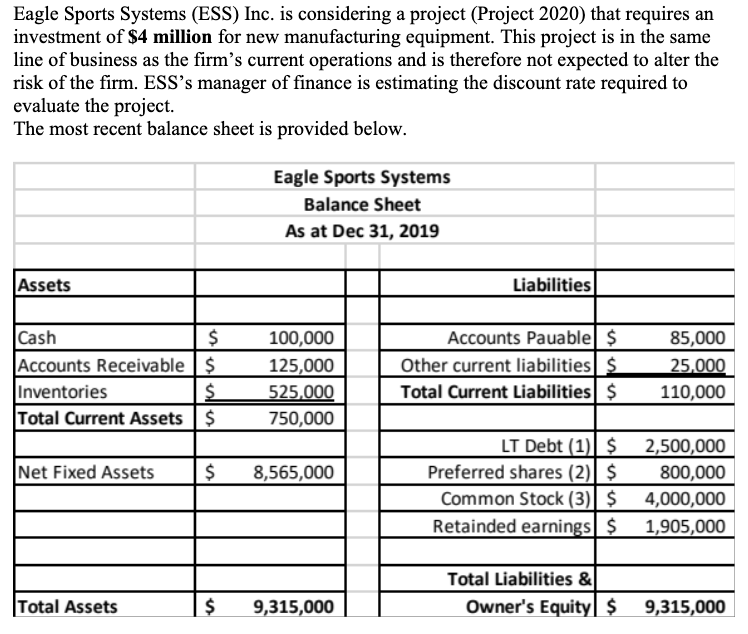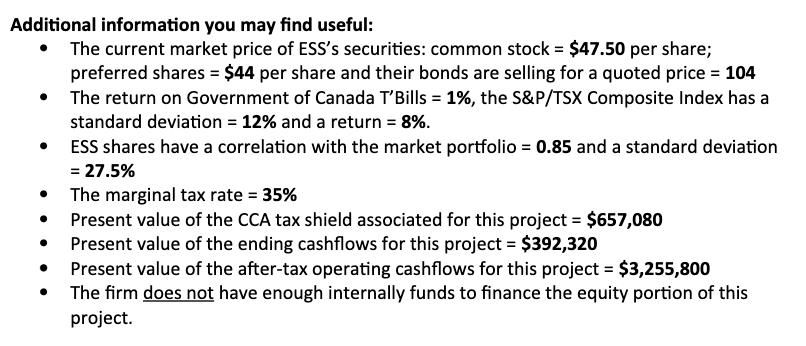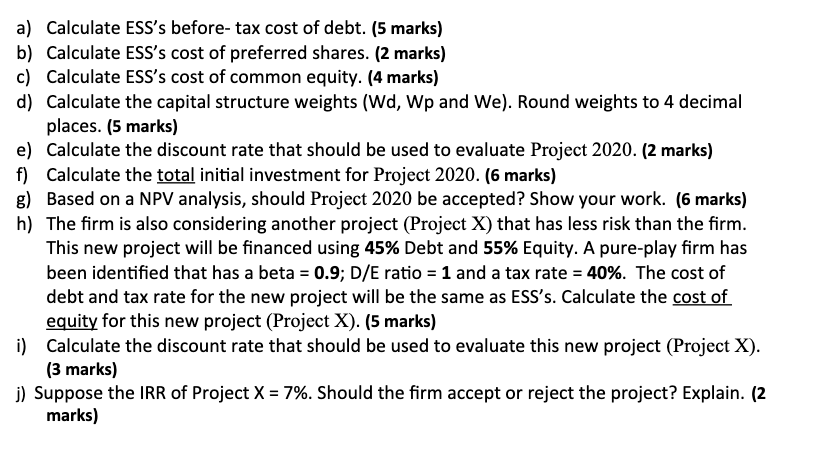



Eagle Sports Systems (ESS) Inc. is considering a project (Project 2020) that requires an investment of $4 million for new manufacturing equipment. This project is in the same line of business as the firm's current operations and is therefore not expected to alter the risk of the firm. ESS's manager of finance is estimating the discount rate required to evaluate the project. The most recent balance sheet is provided below. Eagle Sports Systems Balance Sheet As at Dec 31, 2019 Assets Liabilities Cash $ Accounts Receivable $ Inventories $ Total Current Assets $ 100,000 125,000 525,000 750,000 Accounts Pauable $ Other current liabilities $ Total Current Liabilities $ 85,000 25,000 110,000 Net Fixed Assets $ 8,565,000 LT Debt (1) $ Preferred shares (2) $ Common Stock (3) $ Retainded earnings $ 2,500,000 800,000 4,000,000 1,905,000 Total Liabilities & Owner's Equityl $ Total Assets $ 9,315,000 9,315,000 Notes to financial statements: (1) The 7% semi-annual coupon bonds have a face value of $1,000, were issued 5 years ago and have 15 years to maturity. Flotation costs to issue new bonds = 4% (2) The preferred shares have a $50 par value and 8% dividend. Flotation costs to issue new preferred = 5%. (3) There are 250,000 common shares outstanding. Flotation costs to issue new common = 6%. Additional information you may find useful: The current market price of ESS's securities: common stock = $47.50 per share; preferred shares = $44 per share and their bonds are selling for a quoted price = 104 The return on Government of Canada TBills = 1%, the S&P/TSX Composite Index has a standard deviation = 12% and a return = 8%. ESS shares have a correlation with the market portfolio = 0.85 and a standard deviation = 27.5% The marginal tax rate = 35% Present value of the CCA tax shield associated for this project = $657,080 Present value of the ending cashflows for this project = $392,320 Present value of the after-tax operating cashflows for this project = $3,255,800 The firm does not have enough internally funds to finance the equity portion of this project. a) Calculate ESS's before- tax cost of debt. (5 marks) b) Calculate ESS's cost of preferred shares. (2 marks) c) Calculate ESS's cost of common equity. (4 marks) d) Calculate the capital structure weights (Wd, Wp and We). Round weights to 4 decimal places. (5 marks) e) Calculate the discount rate that should be used to evaluate Project 2020. (2 marks) f) Calculate the total initial investment for Project 2020. (6 marks) g) Based on a NPV analysis, should Project 2020 be accepted? Show your work. (6 marks) h) The firm is also considering another project (Project X) that has less risk than the firm. This new project will be financed using 45% Debt and 55% Equity. A pure-play firm has been identified that has a beta = 0.9; D/E ratio = 1 and a tax rate = 40%. The cost of debt and tax rate for the new project will be the same as ESS's. Calculate the cost of equity for this new project (Project X). (5 marks) i) Calculate the discount rate that should be used to evaluate this new project (Project X). (3 marks) j) Suppose the IRR of Project X = 7%. Should the firm accept or reject the project? Explain. (2 marks)










